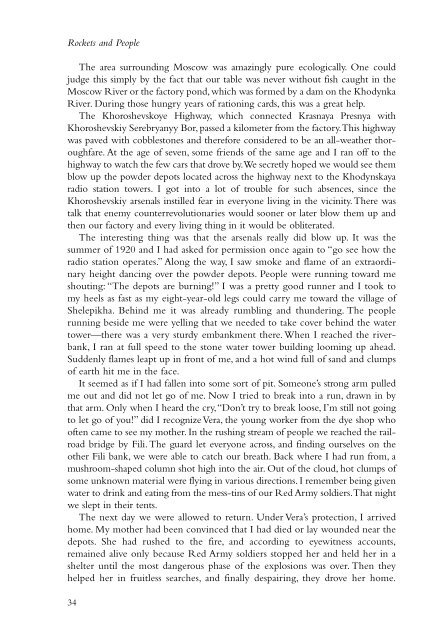to open next chapter. - NASA's History Office
to open next chapter. - NASA's History Office
to open next chapter. - NASA's History Office
Create successful ePaper yourself
Turn your PDF publications into a flip-book with our unique Google optimized e-Paper software.
Rockets and People<br />
The area surrounding Moscow was amazingly pure ecologically. One could<br />
judge this simply by the fact that our table was never without fish caught in the<br />
Moscow River or the fac<strong>to</strong>ry pond, which was formed by a dam on the Khodynka<br />
River. During those hungry years of rationing cards, this was a great help.<br />
The Khoroshevskoye Highway, which connected Krasnaya Presnya with<br />
Khoroshevskiy Serebryanyy Bor, passed a kilometer from the fac<strong>to</strong>ry.This highway<br />
was paved with cobbles<strong>to</strong>nes and therefore considered <strong>to</strong> be an all-weather thoroughfare.<br />
At the age of seven, some friends of the same age and I ran off <strong>to</strong> the<br />
highway <strong>to</strong> watch the few cars that drove by.We secretly hoped we would see them<br />
blow up the powder depots located across the highway <strong>next</strong> <strong>to</strong> the Khodynskaya<br />
radio station <strong>to</strong>wers. I got in<strong>to</strong> a lot of trouble for such absences, since the<br />
Khoroshevskiy arsenals instilled fear in everyone living in the vicinity.There was<br />
talk that enemy counterrevolutionaries would sooner or later blow them up and<br />
then our fac<strong>to</strong>ry and every living thing in it would be obliterated.<br />
The interesting thing was that the arsenals really did blow up. It was the<br />
summer of 1920 and I had asked for permission once again <strong>to</strong> “go see how the<br />
radio station operates.” Along the way, I saw smoke and flame of an extraordinary<br />
height dancing over the powder depots. People were running <strong>to</strong>ward me<br />
shouting: “The depots are burning!” I was a pretty good runner and I <strong>to</strong>ok <strong>to</strong><br />
my heels as fast as my eight-year-old legs could carry me <strong>to</strong>ward the village of<br />
Shelepikha. Behind me it was already rumbling and thundering. The people<br />
running beside me were yelling that we needed <strong>to</strong> take cover behind the water<br />
<strong>to</strong>wer—there was a very sturdy embankment there. When I reached the riverbank,<br />
I ran at full speed <strong>to</strong> the s<strong>to</strong>ne water <strong>to</strong>wer building looming up ahead.<br />
Suddenly flames leapt up in front of me, and a hot wind full of sand and clumps<br />
of earth hit me in the face.<br />
It seemed as if I had fallen in<strong>to</strong> some sort of pit. Someone’s strong arm pulled<br />
me out and did not let go of me. Now I tried <strong>to</strong> break in<strong>to</strong> a run, drawn in by<br />
that arm. Only when I heard the cry,“Don’t try <strong>to</strong> break loose, I’m still not going<br />
<strong>to</strong> let go of you!” did I recognize Vera, the young worker from the dye shop who<br />
often came <strong>to</strong> see my mother. In the rushing stream of people we reached the railroad<br />
bridge by Fili. The guard let everyone across, and finding ourselves on the<br />
other Fili bank, we were able <strong>to</strong> catch our breath. Back where I had run from, a<br />
mushroom-shaped column shot high in<strong>to</strong> the air. Out of the cloud, hot clumps of<br />
some unknown material were flying in various directions. I remember being given<br />
water <strong>to</strong> drink and eating from the mess-tins of our Red Army soldiers.That night<br />
we slept in their tents.<br />
The <strong>next</strong> day we were allowed <strong>to</strong> return. Under Vera’s protection, I arrived<br />
home. My mother had been convinced that I had died or lay wounded near the<br />
depots. She had rushed <strong>to</strong> the fire, and according <strong>to</strong> eyewitness accounts,<br />
remained alive only because Red Army soldiers s<strong>to</strong>pped her and held her in a<br />
shelter until the most dangerous phase of the explosions was over. Then they<br />
helped her in fruitless searches, and finally despairing, they drove her home.<br />
34
















